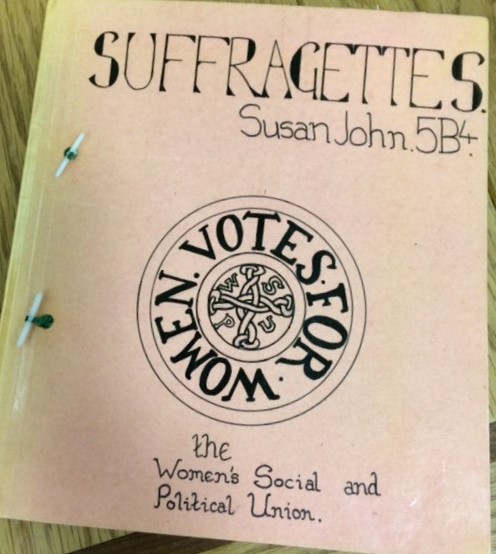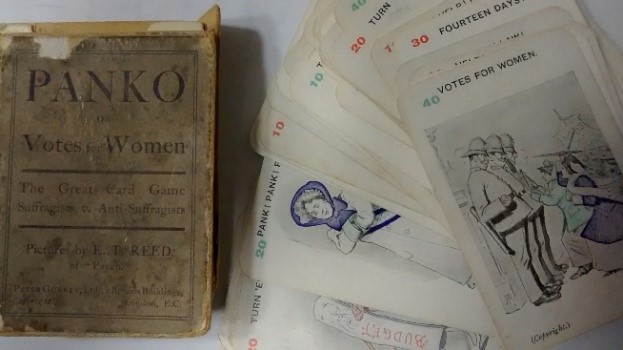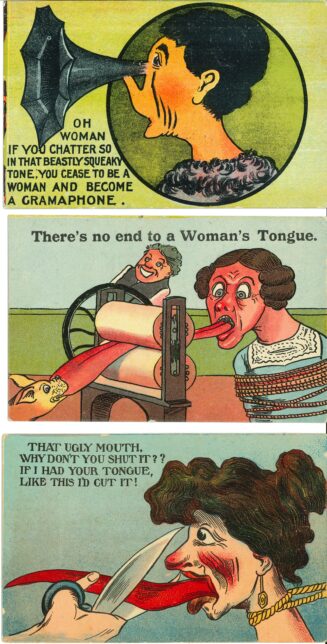It’s fair to say that I’ve been interested in Suffragettes since I was young girl. Maybe it’s being Mancunian – the Pankhurst legacy looms large in that city of radicals. As a 15 year old, this was my subject of choice for my History exam project, and as an adult and keen family history detective I remember being very excited to discover, a few years ago, that the death certificate for my Great-Great-Grandma was signed by Emmeline Pankhurst, who was a Registrar of births, deaths and marriages.

Now, more than 40 years after that piece of school work, I’m about to embark on a somewhat larger project with women’s suffrage at its core as I join the University of Glasgow as a part-time PhD History Researcher, whilst continuing to work on a more part-time basis in my role as Director of Operations, Resources and Enterprise at Glasgow Women’s Library.
My PhD is a Scottish Graduate School for Arts and Humanities ‘Collaborative Doctoral Award’ (CDA), funded by the Arts and Humanities Research Council. CDAs are partnerships between the PhD student, the Higher Education Institution and a non-academic organisation – in this case, Glasgow Women’s Library. CDA partnerships aim to create long-term benefits for collaborators, providing access to resources, knowledge and expertise that may not otherwise have been available and also provide social, cultural and economic benefits to wider society.
This is an incredibly exciting opportunity, and my subject, with a working title of Satire and Suffragettes: Women’s Rights in Everyday Material Culture in Britain, 1900-1930, will explore an area that little academic research has examined in depth so far. It will focus on key museum and archive collections of suffrage memorabilia in the UK, starting with our own collection at GWL – amongst our most popular items.

In the intense debates over women’s rights during the period 1900-30, the British public bought, posted and gifted a wide variety of suffragette memorabilia, including postcards, ceramics, decorative items and board games, and I’ll be researching these every day, mass-manufactured products. Unlike items made specifically by or for pro-suffrage organisations to raise money or support for the cause, these objects were privately manufactured by companies to meet and profit from a public demand centring on an issue that split opinion across the nation.


I’m hoping to open up questions surrounding wider societal engagement with the issue of women’s social and political roles, and examine the economy behind a uniquely situated collection of popular-political objects. Who produced the items and with what motivations – economic, political or ideological? How profitable were the products? Who sold, purchased and consumed these objects, and how were they used? With regard to the postcards, what do the personal notes reveal in terms of senders, recipients and wider political discourse?
There is a great deal to research, and I’ll be sharing my findings along the way. I’ll be delivering talks, exhibitions and other events (online and at GWL) showcasing the collections and the knowledge developed at various stages of the research.
I’ve been involved with Glasgow Women’s Library since 1993, when I graduated from Glasgow School of Art and became a volunteer at GWL in the tiny shop-front Garnethill premises it inhabited at the time. I became a (part) paid employee a decade later, and for several years have been one half of the Senior Management Team with GWL co-founder Adele Patrick. Although I’ve been involved in many other things along the way – activism, housing projects, undertaking short courses, this PhD sees a major shift in my life that I intend to fully embrace. At GWL we place great value on Lifelong Learning. I’ll be 63 by the time I graduate and I hope this shows that it’s never too late to follow a passion.
As a final thought to share, this life development has made me reflect on the issue of class, thinking back to that 15 year old girl carefully writing about Suffragettes in ink pen. I had a very working class upbringing, born and raised on an east Manchester council estate, with both parents working in factories. There were no books in our house, and no room to study or escape the chaos of family life: that project, like all homework, was done on the settee with the TV on. I did well at school, but my Mum never pressurised me in any direction of life – she always said ‘just do your best’. I was the first in my extended family to get a degree, and am the first to be studying for a PhD. My Mum was born on 16th July 1928, just two weeks after the law was finally passed that give women the vote on the same terms as men.
I received the email informing me that the PhD application was successful on the day of my Mum’s funeral in May 2020. In the first Covid-19 lockdown, saying my final goodbye to her involved a 600 mile round trip drive. We had pulled in to a closed service station on the deserted M6 for a break and I randomly checked my emails. I take this as an auspicious sign – and, with my Mum very much in mind and heart, I intend to ‘just do my best’.
I would like to thank, for their support and encouragement: the Scottish Graduate School for Arts and Humanities; the Arts and Humanities Research Council; the University of Glasgow, College of Arts; my Supervisors, Dr Maud Bracke and Dr Alexandra Ross; the Board and staff team at Glasgow Women’s Library – all of these have made this possible.
If you are interested in my research topic, hold any collections of suffrage memorabilia, or can help me in any way, please email me at sue.john@womenslibrary.org.uk or contact me on Twitter @SueJohnGWL

6 replies on “Satire and Suffragettes – Objects of Interest.”
Hi Sue. Have thoroughly enjoyed reading this first report as you embark on this exciting PhD research journey. Will look forward
to reading the next one and all subsequent news on your progress. All good wushes and lots of love. Chris x
Thank you Christine!
Congratulations and really inspiring blog post Sue. My mum was born in 1928 and I get exactly what you say about your mum. Remember fondly processing with you for March of Women 2015 with your great sash for Joan Eardley. Have fun and as you know I love talking about all this stuff so if I can be of any help I will ! Anna
Thanks so much Anna – happy memories indeed. And some exciting events (hopefully) coming up for the Joan centenary!
What a lovely and well deserved opportunity and wishing you all the very best with this fascinating research.
Thank you Fiona! That’s so kind – I can’t wait to be delving into collections across the UK as part of this research. Hope you are well, and that we’ll see you in GWL when we can!